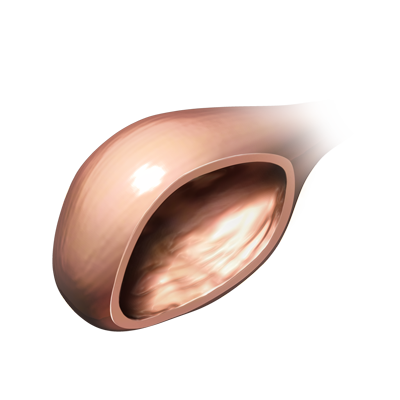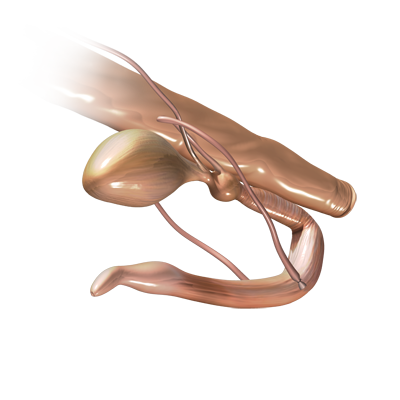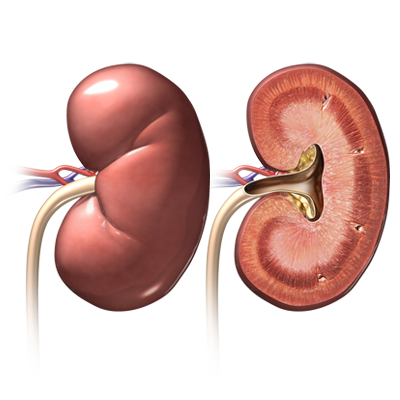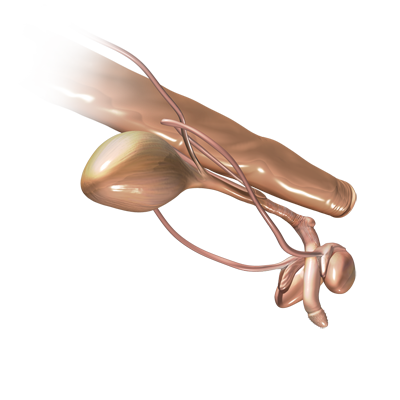
The urogenital system includes the urinary and reproductive organs.
The urinary system is divided into two regions based on anatomy and function: upper (kidneys and ureters) and lower urinary (urinary bladder and urethra) tracts. The upper urinary tract filters metabolic wastes from the blood to be excreted into the urine. The kidneys also participate in blood pressure regulation and maintenance of the delicate electrolyte and water balance within the body-keeping only what is needed. The lower urinary tract serves as a reservoir for urine (bladder) and a pathway for excretion (urethra). Indications of a urinary tract problem are varied: excessive urination and drinking, straining to urinate, blood in the urine, odor to urine, changes in litter box habits, vomiting, diarrhea, inappetance, incontinence, and lethargy.
The genital system consists of the reproductive organs: the testicles, prostate, and bulbourethral glands. These organs produce hormones and allow reproduction. Signs associated with problems of the genital tract include: discharge, odor, straining to urinate and/or defecate, and lethargy.
Common urogenital ailments affecting cats:
- Lower urinary tract disease (LUTD): also known as Feline Urologic Syndrome (FUS). This common feline condition does not yet have a definitive cause. Male and female cats may be plagued with this condition. LUTD looks and acts like a urinary tract infection; however, there is no bacterial growth in the urine. Cats are inherently resistant to urinary tract infections because they produce highly concentrated urine. Significant urinary tract inflammation can occur to cause life threatening urinary tract obstruction.
- Kidney failure: acute and chronic. Acute kidney failure can be caused by infections, kidney stones, toxins, and drugs to name a few. Aging pets may develop chronic kidney failure. Often, by the time chronic kidney failure is diagnosed, the cause cannot be determined.
- Urinary bladder stones : some stones form due to the presence of infection; others form by mineral imbalances in the urine. Kidney stones are less common.
Bladder

Urine, produced by the kidneys, is stored in the urinary bladder before exiting the body through the urethra. The urethra acts as a channel for urine excretion; its length offers protection against infection from the outside. Cats with urinary bladder inflammation (cystitis) strain to produce small amounts of urine (may appear as constipation), urinate outside the litter box, and may have blood in their urine. Common causes of urinary bladder inflammation include feline idiopathic interstitial cystitis and stones. Urinary tract infections affect cats less commonly due to their highly concentrated urine. An inability to urinate (straining with no urine production) requires emergency treatment to relieve the painful, life threatening obstruction.
Castration

Male cats that are not neutered tend to roam, become territorial, acquire illnesses, and develop inter-cat aggression. Roaming male cats, constantly in search of a female, lead to unwanted pregnancies. Fighting behavior sends many cats to the veterinarian often to care for wounds; they also risk contracting many infectious diseases, such as Feline Immunodeficiency Virus (FIV). Male cats that will not be bred should be neutered by around 6 months of age. Your recovering cat needs to be rested-no running or jumping as overactivity can lead to complications such as bleeding and infection.
Cystitis

Urine, produced by the kidneys, is stored in the urinary bladder before exiting the body through the urethra. The urethra acts as a channel for urine excretion; its length offers protection against infection from the outside. Cats with urinary bladder inflammation (cystitis) strain to produce small amounts of urine (may be mistaken for constipation), urinate outside the litter box, and may have blood in their urine. Common causes of cystitis include feline idiopathic interstitial cystitis, stones, polyps, and tumors. Urinary tract infections affect cats less commonly (<5%) due to their highly concentrated urine. Suspicion of feline cystitis is based on history and physical examination; definitive diagnosis requires a urinalysis, urine culture, and abdominal x-rays. Complicated cases of cystitis may require more advanced imaging with ultrasound and/or contrast studies. Treatment for cats with uncomplicated (non-obstructive) cystitis includes a combination of fluid therapy to help flush the bladder, dietary changes, pain relief, and medications to alleviate bladder spasms and restore normal urine flow. Antibiotics are indicated only when an infection is found. An inability to urinate (straining with no urine production) requires emergency treatment to relieve the painful, life threatening urinary tract obstruction.
Kidneys

The kidneys, lying just under the spinal column, receive nearly 25% of the blood pumped out of the heart. The kidneys maintain water and electrolyte balance, regulate blood pressure and provide an elimination route for toxins. Illness due to kidney disease may be due to infection, inflammation, toxin ingestion (e.g.: lilies and antifreeze), and cancer. Symptoms of kidney disease vary widely depending on the underlying cause. Cats with acute (sudden) kidney failure are quite ill: vomiting, lethargy, and anorexia. In contrast, cats with chronic (slow onset) kidney failure may not show any outward signs of a problem; the kidney disease is often incidentally found on screening lab work. Regular wellness testing with blood and urine evaluations allows early detection and treatment of kidney disease.
Testes

The cat has two testicles, housed within the scrotum. Testicular diseases are uncommon in cats as many cats are neutered. In intact males, problems associated with the testicles include congenital abnormalities, such as cryptorchidism (testicle fails to descend into scrotum and is retained in the abdomen); infections; trauma; and tumors. Testicular tumors are rare in cats; however, cats with cryptorchidism have a higher incidence. Cats with testicular disease may present with a swelling in the scrotum or problems during breeding. Cats that will not be used for breeding should be castrated (surgical removal of the hormone producing testicles) to potentially cure the disease, prevent pet overpopulation, and avoid unwanted behaviors (e.g.: inter-cat aggression and roaming to find a mate).
Urogenital Normal

The male cat’s reproductive tract includes two testicles, housed within the scrotum, and the bulbourethral and prostate glands, which lie within the pelvic canal. Cats that will not be used for breeding should be castrated (surgical removal of the hormone producing testicles) to prevent pet overpopulation and unwanted behaviors (e.g.: inter-cat aggression and roaming to find a mate). Sterilizing your cat will not change their loving personality; it will make them less prone to illness. A castrated cat will focus more on your family rather than finding a mate.
What's Next
Call us to schedule an appointment
Meet with a doctor for an initial exam.
Put a plan together for your pet.

